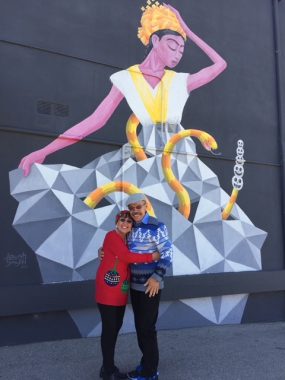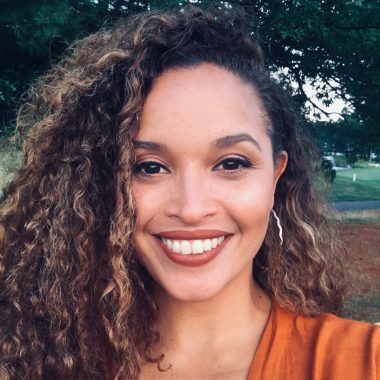2 Women on Mission to Raise Awareness in Latino Community
Written by |

When Enma Espinosa worked during the day and her husband, Francisco Espinosa, worked the night shift, they barely saw each other. So it took longer for her to realize the small changes in his cognition were not just a normal part of aging.
It wasn’t until her husband’s barber called to inform Espinosa that he had paid twice on several occasions that she knew something was wrong. Francisco Espinosa was eventually diagnosed with dementia in his 60s — but their doctor bluntly said there was no cure, providing no referrals or any hope.

Enma and Francisco Espinosa pose for a photo in front of a mural. (Photo courtesy of Enma Espinosa)
The couple took things into their own hands, and are making the most of the time they have together.
“We created our own recipe because we were given no resources,” said Enma Espinosa, 70, in a phone interview with Alzheimer’s News Today. “I became an advocate, and I have to struggle dealing with doctors and making sure he gets the right kind of treatments.”
That recipe included walks, hiking, eating healthy, staying socially active, taking health, balance, nutrition, and memory classes, and joining several senior centers.
For patients with Alzheimer’s disease, it often takes a long time to get a confirmed diagnosis, causing a delay in services and sending families scrambling for answers.
This delay is particularly accentuated in the Latino community, as language and cultural barriers lead to even longer lag times between symptom onset and diagnosis — despite the fact that this is a group 1.5 times more likely to develop Alzheimer’s than whites.
“There’s not too many doctors that are sensitive to their Hispanic culture,” said Espinosa, who lives in Los Angeles. “So it’s been quite a journey.”
Additionally, a lack of Latino representation in clinical trials can leave out important data for future treatments. According to a 2016 report, 1% of participants in National Institutes of Health clinical trials are Latino, but they make up more than 18% of the U.S. population and more than 8% of those 65 and older.
“If we’re not represented in science equitably, that means that whatever is learned from another group gets imposed onto us,” said neuropsychologist Mirella Díaz-Santos, PhD, director of the Equity for Latinx/Hispanic Healthy Aging (ELHA) Lab, in California. The faculty neuropsychologist at the UCLA Mary S. Easton Center for Alzheimer’s Disease Research also does volunteer outreach around Alzheimer’s with the Los Angeles Latino community.
“The communities are telling us, we need research that actually makes a difference, and an impact to their life right now,” Díaz-Santos said.
To combat delayed diagnoses and improve clinical representation, professionals like Díaz-Santos, Latino-specific and large Alzheimer’s advocacy groups, and those affected by the disease, are creating more Spanish educational materials on the disease, and working for greater awareness. They’re also teaching the Latino community how to advocate for themselves.

Mirella Díaz-Santos smiles in her UCLA faculty headshot. (Photo courtesy of Mirella Díaz-Santos)
Díaz-Santos, who immigrated to the U.S from Puerto Rico in 2008 to go to graduate school, has been working with the Women’s Alzheimer’s Movement (WAM) for the past three years to engage with the Latino community and educate them about brain health, early signs of Alzheimer’s, best practices for prevention, and how to get involved in clinical trials.
She’s also served as an expert in two of WAM’s educational events — Move for Minds and The WAM Summit: The Latest in Women’s Brain Research, Alzheimer’s Prevention, and Healthy Aging.
WAM itself has produced Alzheimer’s-focused content in Spanish and helped translate educational videos, such as those featured in this summer’s Brain It On event. That summit featured brain health experts and celebrities, and written materials like “The WAM Guide: Tips for a Brain-Healthy Lifestyle” and WAM’s “10 Things” brochures, which feature advice on what questions to ask doctors, Alzheimer’s warning signs, and prevention information.
As part of National Alzheimer’s Month and celebrations of Día De Los Muertos or Day of the Dead — the Mexican holiday at the beginning of November that honors those who have died with ofrendas, or altars, complete with photos, objects that defined a loved one’s character, flowers, art, and candied skulls — WAM created a digital altar to remember loved ones.
Recent studies have shown that stress and environmental factors such as air pollution, pesticides, and vitamin D deficiency can lead to neurodegenerative diseases like Alzheimer’s, which Díaz-Santos believes is partially to blame for the higher risk Latinos have of developing the disease. It was a wake-up call for Díaz-Santos as her maternal grandmother, Estrella, was diagnosed with Alzheimer’s.
“As a clinical fellow at UCLA at the time, I was already seeing all the multiple factors that could increase the risk of our Latino communities, and for developing Alzheimer’s in the future,” Díaz-Santos said. “I got really scared, and I started translating that basic science into less medical jargon to engage all the communities.”
That translation for Díaz-Santos is taking place among faculty and staff at UCLA, local community events, and interacting with organizations that bring more awareness to Alzheimer’s for Latinos.
For example, Díaz-Santos worked with the Alzheimer’s Association and Vision y Compromiso, a California organization committed to bettering Latino health through Promotores (promoters) that disseminate information throughout the community. She helped the association convey Alzheimer’s information to promoters so they could understand it in Spanish.
Adding to the challenge of raising awareness in the Latino community is a cultural stigma behind dementia, Espinosa said. Some relate dementia with being “crazy” — and no one wants to be viewed that way, she notes.
“It’s kind of a stereotype, and [we] don’t really talk too much about it in the Hispanic culture,” she said.
Caring for Francisco for the past 11 years has been a continual learning experience for Espinosa, between finding information in lay terminology and pushing back on doctors who talk too fast or loud, which can agitate him.
Espinosa has no problem challenging doctors. She carries around a “portfolio” with notes that include all the struggles she and her husband have gone through. In one example, a physician refused Francisco palliative care, which helps people manage the symptoms of advanced illness, and it took two months for him to be approved for it. According to Espinosa, it’s not made available unless a patient advocates for it on their own, even if they qualify. The language barrier adds to the difficulty.
She’s been part of a Spanish-speaking virtual support group for caregivers to Alzheimer’s patients, which she named Mujeres Poderosas, translating to “Powerful Women” in English.
During the pandemic, Díaz-Santos led the group, which focuses on self-care and building social connections, the lack of which can increase the risk of Alzheimer’s disease. Participation in the group is free and open to any caregiver of a loved one with Alzheimer’s, Díaz-Santos said.
Espinosa also makes use of the University of Southern California’s Family Caregiver Support Center. The drive to support her husband and others going through the same thing comes from deep inside.
“What inspires me to go through this journey is because I love my husband,” Espinosa said. “And I have a lot of empathy for all the people that are going through this disease.”
As part of Díaz-Santos’ current clinical research program, she has been interviewing Latino caregivers about their experience with Alzheimer’s with the goal of understanding barriers to recruitment and retention in clinical trials. Most of the work for organizations like WAM and the Alzheimer’s Association is volunteer-based, but she relishes the chance to combine her clinical work with her passion.
“I made a commitment that my work is alongside my communities,” Díaz-Santos said. “That makes my scholarly work more meaningful because I’m all about public policy and change.”






